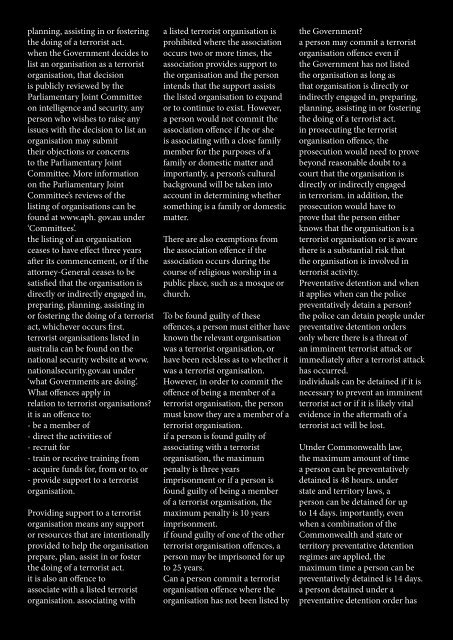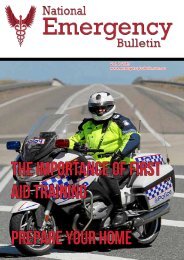National Emergency Magazine Vol. 4 2014
Create successful ePaper yourself
Turn your PDF publications into a flip-book with our unique Google optimized e-Paper software.
planning, assisting in or fostering<br />
the doing of a terrorist act.<br />
when the Government decides to<br />
list an organisation as a terrorist<br />
organisation, that decision<br />
is publicly reviewed by the<br />
Parliamentary Joint Committee<br />
on intelligence and security. any<br />
person who wishes to raise any<br />
issues with the decision to list an<br />
organisation may submit<br />
their objections or concerns<br />
to the Parliamentary Joint<br />
Committee. More information<br />
on the Parliamentary Joint<br />
Committee’s reviews of the<br />
listing of organisations can be<br />
found at www.aph. gov.au under<br />
‘Committees’.<br />
the listing of an organisation<br />
ceases to have effect three years<br />
after its commencement, or if the<br />
attorney-General ceases to be<br />
satisfied that the organisation is<br />
directly or indirectly engaged in,<br />
preparing, planning, assisting in<br />
or fostering the doing of a terrorist<br />
act, whichever occurs first.<br />
terrorist organisations listed in<br />
australia can be found on the<br />
national security website at www.<br />
nationalsecurity.gov.au under<br />
‘what Governments are doing’.<br />
What offences apply in<br />
relation to terrorist organisations?<br />
it is an offence to:<br />
- be a member of<br />
- direct the activities of<br />
- recruit for<br />
- train or receive training from<br />
- acquire funds for, from or to, or<br />
- provide support to a terrorist<br />
organisation.<br />
Providing support to a terrorist<br />
organisation means any support<br />
or resources that are intentionally<br />
provided to help the organisation<br />
prepare, plan, assist in or foster<br />
the doing of a terrorist act.<br />
it is also an offence to<br />
associate with a listed terrorist<br />
organisation. associating with<br />
a listed terrorist organisation is<br />
prohibited where the association<br />
occurs two or more times, the<br />
association provides support to<br />
the organisation and the person<br />
intends that the support assists<br />
the listed organisation to expand<br />
or to continue to exist. However,<br />
a person would not commit the<br />
association offence if he or she<br />
is associating with a close family<br />
member for the purposes of a<br />
family or domestic matter and<br />
importantly, a person’s cultural<br />
background will be taken into<br />
account in determining whether<br />
something is a family or domestic<br />
matter.<br />
There are also exemptions from<br />
the association offence if the<br />
association occurs during the<br />
course of religious worship in a<br />
public place, such as a mosque or<br />
church.<br />
To be found guilty of these<br />
offences, a person must either have<br />
known the relevant organisation<br />
was a terrorist organisation, or<br />
have been reckless as to whether it<br />
was a terrorist organisation.<br />
However, in order to commit the<br />
offence of being a member of a<br />
terrorist organisation, the person<br />
must know they are a member of a<br />
terrorist organisation.<br />
if a person is found guilty of<br />
associating with a terrorist<br />
organisation, the maximum<br />
penalty is three years<br />
imprisonment or if a person is<br />
found guilty of being a member<br />
of a terrorist organisation, the<br />
maximum penalty is 10 years<br />
imprisonment.<br />
if found guilty of one of the other<br />
terrorist organisation offences, a<br />
person may be imprisoned for up<br />
to 25 years.<br />
Can a person commit a terrorist<br />
organisation offence where the<br />
organisation has not been listed by<br />
the Government?<br />
a person may commit a terrorist<br />
organisation offence even if<br />
the Government has not listed<br />
the organisation as long as<br />
that organisation is directly or<br />
indirectly engaged in, preparing,<br />
planning, assisting in or fostering<br />
the doing of a terrorist act.<br />
in prosecuting the terrorist<br />
organisation offence, the<br />
prosecution would need to prove<br />
beyond reasonable doubt to a<br />
court that the organisation is<br />
directly or indirectly engaged<br />
in terrorism. in addition, the<br />
prosecution would have to<br />
prove that the person either<br />
knows that the organisation is a<br />
terrorist organisation or is aware<br />
there is a substantial risk that<br />
the organisation is involved in<br />
terrorist activity.<br />
Preventative detention and when<br />
it applies when can the police<br />
preventatively detain a person?<br />
the police can detain people under<br />
preventative detention orders<br />
only where there is a threat of<br />
an imminent terrorist attack or<br />
immediately after a terrorist attack<br />
has occurred.<br />
individuals can be detained if it is<br />
necessary to prevent an imminent<br />
terrorist act or if it is likely vital<br />
evidence in the aftermath of a<br />
terrorist act will be lost.<br />
Utnder Commonwealth law,<br />
the maximum amount of time<br />
a person can be preventatively<br />
detained is 48 hours. under<br />
state and territory laws, a<br />
person can be detained for up<br />
to 14 days. importantly, even<br />
when a combination of the<br />
Commonwealth and state or<br />
territory preventative detention<br />
regimes are applied, the<br />
maximum time a person can be<br />
preventatively detained is 14 days.<br />
a person detained under a<br />
preventative detention order has





